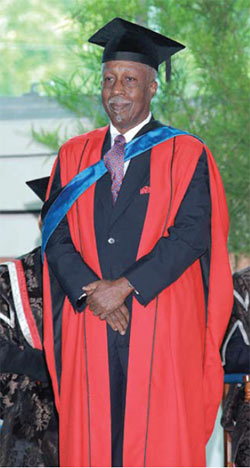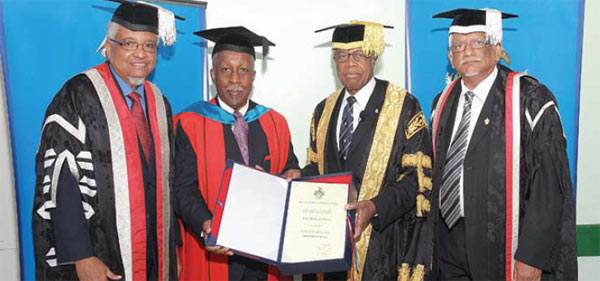 |
 |
 |
|
November 2011
|
HONORARY GRADUATE Reflect, analyse and questionReginald Dumas Unlike you, we had no technological aids. Cell phones and computers did not exist, and the concept of the social media – Facebook and LinkedIn and MySpace and the like – that concept was totally unknown to us; the only things that tweeted and twittered were birds. I am privileged to have witnessed these changes, but are we better off for them? Has our quality of life improved? I’m going to make some assumptions this morning. I’m going to assume that before entering The UWI you thought hard about what you were going to study and why, because you were interested not in getting a degree for the sake of getting a degree but rather a degree towards a particular goal. I’m also going to assume that during your time here the university authorities and the student bodies arranged for persons who have achieved a certain professional success outside the university to come and exchange ideas with you from time to time about life beyond the campus, and thus about your possible future. Lastly, I’m going to assume that your professors and lecturers actively encouraged you to read and broaden your intellectual horizons beyond the classroom and the textbooks and your academic disciplines – in other words, to help you get an education and not merely a degree. I shall make my next remarks on the basis that my assumptions are correct, and that you will therefore have less trouble than most in adjusting to the world. In that case, I have only three pieces of advice to offer you. First, always place emphasis on values. It strikes me constantly that we have grown technologically at the expense of the values crucial for a civilised society – values such as integrity, hard work, community spirit, ethical behaviour, concern for the national over the sectional interest, and so on. All these and other values influence the quality of our lives, and that is why a couple of minutes ago I wondered whether that quality had improved. Unlike many people, too many, I do not see a good quality of life as meaning ownership of expensive material goods. Ask yourselves: is such ownership necessary for a decent life? Do you have to try to impress others? To what end? And do you know how often those same others are quietly sniggering at you behind your back? Or trying to con you? By all means try to improve your financial situation, but please remember, however wealthy and/or famous you may become, that the strength of the values and of the institutional pillars of the society you live in is what above all affects your quality of life, a central element of which is your mental and psychological comfort. My second piece of advice for you is that you constantly bear in mind that, as I just indicated, education is not limited to the possession of a degree, however good that degree. For instance, one of the finest thinkers to emerge from this region, the late CLR James, never attended a university. Bill Gates dropped out of university. As far as I know, Steve Jobs had only an honorary degree. I said a few minutes ago that I assumed you had been encouraged to broaden your intellectual horizons. On leaving the university, you must continue such broadening, especially given today’s knowledge-based world. But be careful: you must not only broaden, you must also reflect and analyse and question. A few months ago I was reading a New York Times article on the distinction between information and ideas. “(I)n the past,” the writer said, “we collected information not simply to know things (but also) to convert it...into ideas that made sense of the information. We sought not just to apprehend the world but to comprehend it, which is the primary function of ideas.”
I invite you, who are now about to embark on a new phase of your lives, to think about it. And to remember, if you are to improve your quality of life, that thought should be followed by considered and coherent action to create and build up social capital, from which you benefit, and in which volunteerism and the social media I mentioned earlier play a central role. My third and last piece of advice is simplicity itself. I implore you to keep this region constantly in the foreground of your thoughts. It is our region; it is the only one we can genuinely call ours. We must therefore do what we can to enhance its indigenous resources, intellectual, economic and other, and to strengthen its institutions – The University of the West Indies, naturally, but also CARICOM, the OECS, the CCJ, the cricket team, and so on. Nobody is going to do it for us. Strengthening institutions walks hand-in-hand with strengthening values. It is a long, slow, hard process. Forget about overnight success. But in that process we all benefit personally, and so do our individual countries and the region as a whole. Many persons have fought hard for this region of ours. Many have passed, or are passing, from the scene. If I have one appeal to make to you today, it is that, however difficult it may often be, and whatever your private issues, you continue that struggle, for your own sake and quality of life, and for the sake and quality of life of those around you, and those who will come after you. |

 I’m not going to tell you how old I am, but I will say that when I graduated from university the parents of most of you here today will not yet have been born. There were so few of us university graduates in those days that a job, usually in government service, was automatically assured. And the legal and medical professions were not as crowded as they are these days. Especially in today’s economic climate, you face a much more complicated task.
I’m not going to tell you how old I am, but I will say that when I graduated from university the parents of most of you here today will not yet have been born. There were so few of us university graduates in those days that a job, usually in government service, was automatically assured. And the legal and medical professions were not as crowded as they are these days. Especially in today’s economic climate, you face a much more complicated task. “But...over the last decade,” the writer went on, “(information) has become competition for (ideas). We are inundated with so much information that we wouldn’t have time to process it even if we wanted to, and most of us don’t want to.” The writer fears that in the future there will be so much information that “there won’t be anything we won’t know. But,” he concludes sombrely, “there will be no one thinking about it.”
“But...over the last decade,” the writer went on, “(information) has become competition for (ideas). We are inundated with so much information that we wouldn’t have time to process it even if we wanted to, and most of us don’t want to.” The writer fears that in the future there will be so much information that “there won’t be anything we won’t know. But,” he concludes sombrely, “there will be no one thinking about it.”